Section 1: Professional Context
My first thought when examining professional learning communities, took me back to my practicum when I was training to become a teacher. My final practicum placement for the Bachelor of Education was located at a school that valued collaboration and teamwork. Every Wednesday, students would have supervised outside time while the teachers would get together in grade-like groupings to brainstorm, problem solve, and share out classroom strategies. This was a wonderful in person opportunity and I wish that I worked somewhere that this was implemented today. Now, I have to look to other networking opportunities that are out there to build my own professional learning community. I use social media to my advantage and am already a member of several professional learning communities via facebook which are mostly targeted towards the middle years in education (grades 6-9) with some variances depending on my interests. Some PLC communities that I am already a part of include BC Grade 7 Teachers, Surrey Grade 6 & 7 Teachers, Prince George District Teachers’ Association Members and Alumni, British Columbia Grade 1/2 Teachers, and Engagement for the Middle: Ideas for Middle School Math Teachers. I am also a big fan of networking via instagram and am currently in the process of building up my teacher instagram @teaching_with_liv. I have found Facebook to be the most effective place of learning in the format of networking, asking for help, and receiving quality feedback from a group, while instagram is a place of daily generated content by individual accounts that aren’t necessarily grouped together. While instagram is a great source of inspiration, it isn’t where I would look to network in terms of learning.
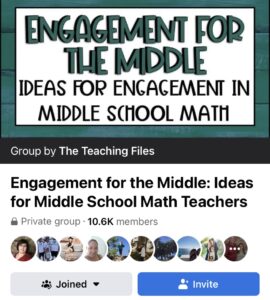
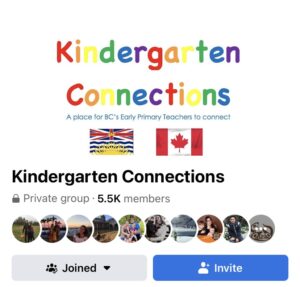
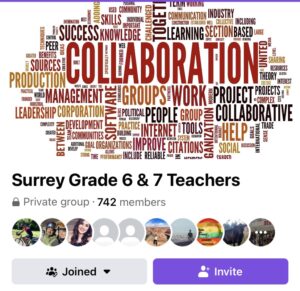
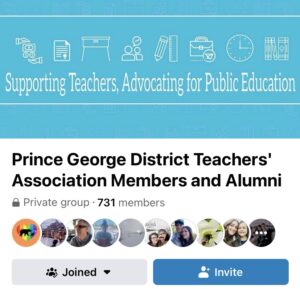
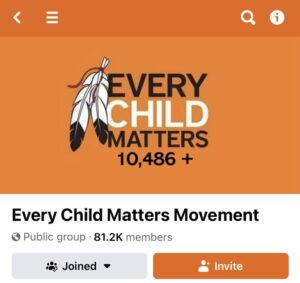
While I previously engaged in professional learning communities, I have found this module’s criteria pushing me to dive back in and take advantage regardless of the busy times I have found myself in with taking this course whilst working full time. I have rejuvenated my engagement in Professional Learning Communities from an academic lens, and I am now looking to target specific areas of mine that need growth. I joined the Beyond Report Cards Facebook group this module to hopefully deepen my understanding of the direction that planning, instruction, and assessment are moving towards in British Columbia. British Columbia is transitioning to a gradeless format of assessment in September of this year (2023) which will affect planning and instruction as well. While my training to become a teacher was based in this gradeless format, I still feel as though my academic background of receiving grades in my personal education has conflicted with my attempt to understand this new way of planning, instruction, and assessment. My hope is to understand the reasoning and method a little bit more. I am anticipating that by joining this professional learning community I will be able to share my learning with my colleagues as we continue to navigate the gradeless assessment format in British Columbia.
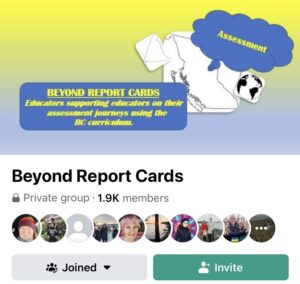
Section 2: Challenges
When joining Beyond Report Cards, I had to answer a series of questions to gain access to the group. The questions to enter the group are listed below along with my responses.
- Please describe your current position in education and what subjects/grade levels you teach
- I am a full time intermediate classroom teacher and I teach grades 6 and 7. I teach all subjects included in the elementary curriculum.
- Please explain your connection with the BC curriculum. (Eg: district, city) If you are outside of BC or Yukon please explain how you explicitly use the BC curriculum for your position.
- I am a teacher in Quesnel school district no. 28. Quesnel is located in the Cariboo region of British Columbia.
- Why would you like to belong to the group, Beyond Report Cards? Please include how you heard about the group.
- I would like to further my understanding of assessment to better understand the relationship between planning, instruction, and assessment. I am looking to decolonize my practice by incorporating a gradeless system of assessment. I heard about this group through a colleague during a professional development session earlier this year in January.
One thing I have noticed when I have participated in professional learning communities in the past, is that not all of my discussion posts or questions generate a lot of traffic. Often it is the posts from the administrators or frequent posters that get a larger response pool. I have tried to jump onto other people’s posts that are already generating a lot of traffic and use it to pose my own related questions. I have found this to be a good strategy to target people already discussing the topic I had in mind and to find relevant responses.
Section 3: Type of Curriculum Theories and Philosophies
When thinking about how Beyond Report Cards connects to the curriculum theories and philosophies, I revisited the mind map I created in modules 2 and 3 with my group. I looked at all of the sections individually, but kept seeing the connections between each section. While I see many characteristics from the learner centered design from Beyond Report Cards, I also see some elements of the subject centered design and problem centered designs. Initially I was convinced that this group was isolated to the learner centered design because it embodies the model that British Columbia education is moving towards which is responsive to teaching the whole child. The new models of education encourage Indigenous ways of knowing (First Peoples Principles document), and modern student centered designs. This group encourages educators to look at the whole child and assess appropriately. The administrator of this group, Shannon Schinkel (2023.), posted an article to the group recently that outlines how to start planning by looking at our students and what we want them to know (begin with the assessment stages), rather than just looking for an interesting lesson. The article goes on to discuss how “In British Columbia, the new reporting order is an opportunity to let go of teacher-centered practices and embrace more student-centered ones.” This directly aligns with the student-centered design. This also connects to the backward mapping strategy which falls under both the learner-centered design, and the subject centered design.
The elements from the subject centered design that I see reflected in this group include the assessment strategies of pre-assessment, formative assessment, and summative assessment. This group strongly encourages an emphasis on the first two assessment types listed, with one final summative assessment reflecting the feedback given from the previous assessments. This assessment style encourages a heavy emphasis on assessment for learning rather than hyperfocusing on assessment of learning. This can be connected to the learner-centered design as well by recognizing that assessment for learning is to personalize the learning journey to the learner and provide direct and ongoing feedback in real time.
The elements from the problem centered design that I see reflected in this group mostly stem from the assessment section with a component from the instructional section. The instruction portion surrounding collaborative learning is strongly encouraged in Beyond Report Cards to foster a sense of community in the students’ learning. The assessment components that are related include rubrics, checklists, portfolios, feedback, identifying areas for improvement, and adjusting to support learning. All of these components are both responsive to the learner, and work to problem solve for the real world situations of the learner.
The philosophies and theories that I think most align with Beyond Report Cards facebook group are listed below:
Progressivism Philosophy:“[Progressivism focus is] based on students’ interests” (Ornstein, 1990/1991).
Essentialism Philosophy: “[The instructional objective is] to promote the intellectual growth of the individual” (Ornstein, 1990/1991)
Pragmatism: emphasizes the practical application of knowledge and the importance of adapting to changing circumstances.
Self Actualizations: The Self-Actualization approach is intended to facilitate learner autonomy and growth. Students invest their time and energy into choice projects and teachers remain as a guiding influence rather than a provider of content (Sowell, 2005.)
Cognitive Process Conception: The humanistic approach is intended to provide an enjoyable learning experience that requires the educator to be a facilitator of learning, essentially being the guide of learning rather than the provider of information (Schiro, 2013.)
Section 4: Analysis
The group Beyond Report Cards is an entirely supportive group. Part of the guidelines when you join this group is that you agree to a set of rules. These rules include, but are not limited to, be respectful, be kind and courteous, and be authentic. This group is active with the posts coming out weekly. The administrator curates the majority of the larger discussion posts as well as hosting zoom sessions for collaborations. This group has been thorough with discussion around assessment and helpful tips when members are seeking advice. My philosophy of education is connected to the philosophies expressed in this group. This group is consistently emphasizing holistic, modern, and child centered ideas that are progressive and relevant to the changes in British Columbia’s educational models. If you are looking for a more progressive style professional learning community that is active, includes current practicing educators, and is relevant to modern education, I suggest engaging with this facebook group.
https://www.facebook.com/groups/beyondreportcardsbc
After examining the internet space of your context of professional practice, think about what mode of communication best suits the space. Also, analyze the web site for clues as to the practice of the site’s participants: What type of curricular design commonly guides planning, instruction and evaluation? (Think back to educational philosophies and conceptions of curriculum at some point in your writing). Then, write out your analysis.
References:
Al-Mousa. (2013). An Examination of CAD Use in Two Interior Design Programs From the Perspectives of Curriculum and Instructors (Queen’s University (Kingston & O. ). F. of E. Queen’s University (Kingston, Eds.; p. vii, 190 leaves.). ProQuest Dissertations Publishing. https://proxy.queensu.ca/login?url=https://www.proquest.com/dissertations-theses/examination-cad-use-two-interior-design-programs/docview/1512073602/se-2?accountid=6180
Blitz. (2013). Can Online Learning Communities Achieve the Goals of Traditional Professional Learning Communities? What the Literature Says (pp. 1–37). Regional Educational Laboratory Mid-Atlantic. https://eric.ed.gov/?id=ED544210
Brown. (2006). Conceptions of curriculum: A framework for understanding New Zealand’s curriculum framework and teachers’ opinions. Curriculum Matters, 2, 164–181. https://doi.org/10.18296/cm.0080
Curriculum organization. (2005). In Sowell, Curriculum : an integrative introduction (3rd ed., pp. 37–51). Pearson/Merrill/Prentice Hall.
Province of British Columbia (2022). Curriculum. https://curriculum.gov.bc.ca
Darby (Ed.). (2009). Sections from chapters 1 to 4. In McNeil, Contemporary curriculum : in thought and action (7th ed., p. xv, 408 p. ;). John Wiley & Sons.
Eisner. (1974). Five conceptions of curriculum: Their roots and implications for curriculum planning. In Vallance (Ed.), Conflicting conceptions of curriculum (pp. 1–18). McCutchan.
Hunkins (Ed.). (2009). The Field of curriculum. In Ornstein, Curriculum : foundations, principles, and issues (5th ed., pp. 1–8). Pearson.
Introduction to the curriculum ideologies. (2013). In Schiro, Curriculum theory : conflicting visions and enduring concerns (2nd ed., pp. 1–13). SAGE.
Lillard, A., & Else-Quest, N. (2006). Evaluating Montessori Education. Science, 313(5795), 1893–1894. http://www.jstor.org/stable/20031400
Al-Mousa. (2013). An Examination of CAD Use in Two Interior Design Programs From the Perspectives of Curriculum and Instructors (Queen’s University (Kingston & O. ). F. of E. Queen’s University (Kingston, Eds.; p. vii, 190 leaves.). ProQuest Dissertations Publishing. https://proxy.queensu.ca/login?url=https://www.proquest.com/dissertations-theses/examination-cad-use-two-interior-design-programs/docview/1512073602/se-2?accountid=6180
Brown. (2006). Conceptions of curriculum: A framework for understanding New Zealand’s curriculum framework and teachers’ opinions. Curriculum Matters, 2, 164–181. https://doi.org/10.18296/cm.0080
Curriculum organization. (2005). In Sowell, Curriculum : an integrative introduction (3rd ed., pp. 37–51). Pearson/Merrill/Prentice Hall.
Province of British Columbia (2022). Curriculum. https://curriculum.gov.bc.ca
Darby (Ed.). (2009). Sections from chapters 1 to 4. In McNeil, Contemporary curriculum : in thought and action (7th ed., p. xv, 408 p. ;). John Wiley & Sons.
Eisner. (1974). Five conceptions of curriculum: Their roots and implications for curriculum planning. In Vallance (Ed.), Conflicting conceptions of curriculum (pp. 1–18). McCutchan.
Hayes. (2003). Making Learning an Effect of Schooling: Aligning Curriculum, Assessment and Pedagogy. Discourse: Studies in the Cultural Politics of Education, 24(2), 225–245. https://doi.org/10.1080/01596300303039
High-quality classroom assessment. (2014). In McMillan, Classroom assessment : principles and practice for effective standards-based instruction (Sixth edition., p. xvii, 454 pages ;). Pearson.
Hunkins (Ed.). (2009). The Field of curriculum. In Ornstein, Curriculum : foundations, principles, and issues (5th ed., pp. 1–8). Pearson.
Hunkins (Ed.). (2013). Curriculum design. In Ornstein, Curriculum : foundations, principles, and issues (6th ed., pp. 149–173). Pearson.
Introduction to the curriculum ideologies. (2013). In Schiro, Curriculum theory : conflicting visions and enduring concerns (2nd ed., pp. 1–13). SAGE.
Lillard, A., & Else-Quest, N. (2006). Evaluating Montessori Education. Science, 313(5795), 1893–1894. http://www.jstor.org/stable/20031400
Ornstein. (1990). Philosophy as a Basis for Curriculum Decisions. The High School Journal, 74(2), 102–109.
Samuelsson, Sheridan, S., & Williams, P. (2006). Five preschool curricula —comparative perspective. International Journal of Early Childhood, 38(1), 11–30. https://doi.org/10.1007/BF03165975
Schinkel, Shannon. 2023, March 8. Stop making grade soup from My Growth Mindset
Shepard. (2000). The Role of Assessment in a Learning Culture. Educational Researcher, 29(7), 4–14. https://doi.org/10.3102/0013189X029007004
The Role of assessment in teaching. (2014). In McMillan, Classroom assessment : principles and practice for effective standards-based instruction (Sixth edition., pp. 1–20). Pearson.
Sections from Chapter 3, 4, 5. (2005). In Sowell, Curriculum : an integrative introduction (3rd ed., p. xvii, 326 p. :). Pearson/Merrill/Prentice Hall.
Sugata Mitra. (n.d.). The child-driven education [Video]. https://www.ted.com/talks/sugata_mitra_the_child_driven_education
Vallance. (1986). A second look at conflicting conceptions of curriculum. Theory Into Practice, 25(1), 24–30. https://doi.org/10.1080/00405848609543194
Watson. (2014). Effective professional learning communities? The possibilities for teachers as agents of change in schools. British Educational Research Journal, 40(1), 18–29. https://doi.org/10.1002/berj.3025